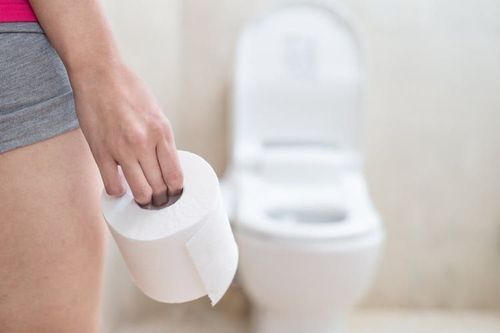This is an automatically translated article.
Posted by Master, Doctor Mai Vien Phuong - Department of Examination & Internal Medicine - Vinmec Central Park International General Hospital
Constipation means slightly different for each person. For some people, constipation means infrequent bowel movements. For others, that means having hard-to-pass stools or straining hard stools. However, others may define constipation as the feeling of not having a bowel movement after having a bowel movement.
1. Chronic versus acute constipation
The main difference between chronic and acute constipation is how long the constipation lasts.
In general, acute or short-term constipation is:
Infrequent, lasting only a few days Due to a change in diet or habits, Travel, inactivity, illness or medication Relieve by Over-the-counter (OTC) laxatives, Exercise or a high-fiber diet On the other hand, chronic constipation is:
Long-lasting, lasting more than three months and even continuing for years Interrupting life a person's personal or work life Not relieved by changes in diet or exercise Requires medical attention or prescription medication Chronic constipation is certainly not uncommon in today's society. Many people suffer from constipation due to lack of nutrients, stress, and lack of exercise. Small lifestyle changes can have a positive effect on your digestion. When extra help is needed, medication can help get things going.
Read on to know what you can do to ease the symptoms of chronic constipation.

2. Change your daily routine
Small changes in your daily routine can improve constipation. Inactivity and poor diet are the two main causes of constipation, so start by adding some movement throughout the day, along with a few fiber-rich foods.
You should not try to make major lifestyle changes all at once. This will be difficult to maintain in the long run. Instead, try to add a few of the following to your schedule until you establish a good daily routine:
Eat your meals at the same time each day. Drink a glass of water as soon as you wake up. Try eating bran cereal for breakfast in the morning. Gentle exercise like walking after breakfast. Park at the end of the parking lot so you have a little walk to get inside your office. Take a 20-minute walk during your lunch break. Cook a new recipe using high-fiber foods, such as beans and legumes. Pack a piece of fruit to eat as a snack. Replace white bread with wholemeal bread and white rice with brown rice. Get enough sleep. When you want to have a bowel movement, go to the toilet immediately. Don't "keep it".
Schedule at some uninterrupted time each day for bowel movements. Research has shown that people with a normal bowel pattern have their bowel movements around the same time each day. Always carry a water bottle with you. Try taking a class at the gym on a regular basis. Take a fiber supplement
Fiber supplements work by bulking up your stool. They are sometimes called block-forming agents. Loose stools cause the intestines to contract, helping to push the stool out.
Fiber supplements are quite simple. They come in capsule and powder form, and even gummies and chewable tablets.
Fiber supplements may also have other benefits, including lowering cholesterol and controlling blood sugar. A type of fiber, called inulin, also helps stimulate the growth of beneficial gut bacteria.
Make sure you drink plenty of water along with a fiber supplement, or it may make your constipation worse.

Eat more fiber
A simple way to help ease the problem of constipation is to eat more foods rich in fiber. Fiber is a mixture of complex carbohydrates. It can be found in the leaves and stems and bran of whole grains. Nuts, fruits, and vegetables are also good sources. Meat and dairy products do not contain any fiber.
Start by gradually adding more fiber to your diet. Make sure you're eating whole fruit instead of drinking fruit juice. Fruit juice has no fiber.
According to the Mayo Clinic, men should consume 30 to 38 grams of fiber per day and women should consume 21 to 25 grams per day. Along with a high-fiber diet, you should also increase your intake of water and other fluids. Aim for at least 1.5 liters per day.
Take a laxative (occasionally)
While effective most of the time, laxatives are usually not a long-term solution to constipation problems. In fact, taking certain laxatives too often can cause dangerous side effects, such as electrolyte imbalance and dehydration.
If you need to take a laxative from time to time to keep things going, you should know that not all laxatives are created equal. Some laxatives are harsher than others. Here are some different types of laxatives and information on how they work in your body to relieve constipation:
Stool softeners
Stool softeners are a type of laxative that works by adding water stools to soften stools and make them easier to pass. Stool softeners such as docusate sodium (Colace, Docusate) can take a few days to start working. They prevent constipation better than treat it, but they are generally gentler than other laxatives.
Osmotic agents
Osmotic agents help retain fluid in your stool. Some examples of osmotic laxatives include:
Magnesium preparations (Milk Magnesium) Polyethylene glycol PEG (Miralax) Sodium phosphate (Fleet Phospho-Soda) Sorbitol Read instructions carefully. Taking too much of these laxatives can lead to serious side effects, like cramps, diarrhea, dehydration, and electrolyte imbalances.

Stimulant laxatives
Stimulant laxatives work by causing your intestines to contract and move stool along. Stimulants are the strongest laxatives and take only a few hours to start working. You should not use them often. Taking them for a long time can change the tone of the large intestine and cause it to stop working properly. If this happens, your colon may become dependent on using laxatives for bowel movements.
Conclusion
If you are living with chronic constipation, getting back to the basics with a diet high in fiber, water and regular exercise can help restore bowel function. Making small changes to your diet, daily routine, water consumption, and physical activity can also aid your digestion. You can also turn to medications like stool softeners and laxatives if you need more help.
Changes take time, but if you have any concerns, make an appointment with your doctor.
Currently, Vinmec Times City International General Hospital is applying a treatment method for cases of constipation due to a decrease or loss of defecation reflex by anal electrical stimulation combined with interference waves, biofeedback episode. study (Biofeedback). The above method has helped > 80% of patients recover the defecation reflex, improve bowel motility and the process of excreting stools, helping to improve constipation.
Please dial HOTLINE for more information or register for an appointment HERE. Download MyVinmec app to make appointments faster and to manage your bookings easily.
ReferenceChronic constipation. (n.d.) patienteducationcenter.org/wp-content/uploads/2013/03/HMS-Broch-Constipation-4.FINAL_.pdf Flamm, G., Glinsmann, W., Kritchevsky, D., Prosky, L., & Roberfroid , M. (2001). Inulin and oligofructose as dietary fiber: A review of the evidence [Abstract]. Critical Reviews in Food Science and Nutrition, 41 (5), 353-362 dx.doi.org/10.1080/20014091091841 Hsieh, C. (2005, December 1). Treatment of constipation in older adults. American Family Physician, 72 (11), 2277-2284 aafp.org/afp/2005/1201/p2277.html Increasing fiber intake. (n.d.) ucsfhealth.org/education/increasing_fiber_intake/ Mayo Clinic Staff. (2015, October 8). Chart of high-fiber foods mayoclinic.org/healthy-lifestyle/nutrition-and-healthy-eating/in-depth/high-fiber-foods/art-20050948 Mayo Clinic Staff. (2014, June 6). Over-the-counter laxatives for constipation: Use with caution mayoclinic.org/diseases-conditions/constipation/in-depth/laxatives/art-20045906 Pal, S., Khossousi, A., Binns, C., Dhaliwal, S. , & Ellis, V. (2011). The effect of a fiber supplement compared to a healthy diet on body composition, lipids, glucose, insulin and other metabolic syndrome risk factors in overweight and obese individuals [Abstract]. British Journal of Nutrition, 105 (1), 90-100 cambridge.org/core/journals/british-journal-of-nutrition/article/the-effect-of-a-fibre-supplement-compared-to-a-healthy -diet-on-body-composition-lipids-glucose-insulin-and-other-metabolic-syndrome-risk-factors-in-overweight-and-obese-individuals/DDE90317EE5D477C1E0594B6E2B1AA79














